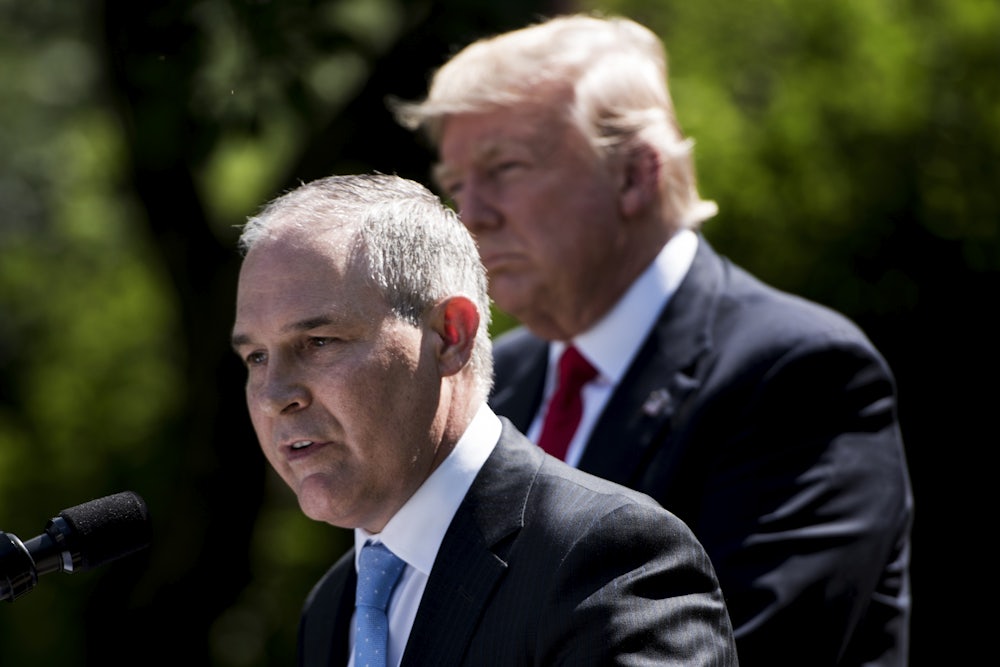Last week was a rough one for Environmental Protection Agency Administrator Scott Pruitt, and this week isn’t looking any better. On Monday, The Atlantic uncovered evidence that Pruitt personally approved huge raises for his political staffers in direct defiance of White House orders, and lied to a Fox News reporter about it. Meanwhile, The New York Times reported that the federal government’s top ethics official is now getting involved in Pruitt’s growing list of corruption and waste scandals, asking the EPA to take “appropriate actions” to address questions of impropriety.
But one bright spot for Pruitt remains: His good standing with President Donald Trump. Even as an increasing number of Democratic and Republican lawmakers—and Trump’s own chief of staff, John Kelly—have advocated for Pruitt’s resignation, the president has so far stood by him. “For the moment it appears Pruitt is not on his way out,” NPR’s Ron Elving wrote on Monday. “And if what doesn’t kill you makes you stronger, then Pruitt may still be on his way up.”
How could this be? Trump, after all, has fired other cabinet officials for much more benign offenses. On Saturday, Trump defended his EPA chief in a tweet by saying he was going a “good job.” But Pruitt hasn’t accomplished much (yet) when it comes to rolling back regulations, so a “good job” must mean something else.
George David Banks, who recently left his position advising Trump on energy and climate issues, said Pruitt’s most valuable accomplishment to Trump is likely that he’s popular with Republican voters. “The president cares about his base and how they view Pruitt,” he said. “That may be the most important part of the job in the president’s eyes.”
There don’t appear to be polls showing Pruitt’s support among Trump’s base, but Banks’s observation is backed up by Trump’s own remarks. On Friday—one of the most intense days of media scrutiny into Pruitt’s scandals yet—Trump returned from West Virginia, where he has one of the highest approval ratings in the country. “I just left coal and energy country,” Trump said on the plane ride back to D.C. “They love Scott Pruitt.” That Pruitt could even achieve name recognition, much less support, is a testament to his political messaging—which Banks noted is much like Trump’s. “They do have similar styles,” Banks said. “The president probably appreciates Pruitt’s political skills.”
Pruitt’s tendency to follow Trump’s playbook could also explain why the president is so fond of him. Pruitt’s media strategy is similarly aggressive, attacking individual reporters and characterizing all negative coverage as “fake news.” Last year, for example, the EPA issued a press release accusing Times reporters Eric Lipton and Roni Caryn Rabin of reporting “false facts” in its story about Pruitt’s decision not to ban a controversial pesticide. That same month, EPA spokesperson Jahan Wilcox reportedly called the police on two reporters attempting to cover a Pruitt event in North Dakota. “Intense personal attacks on individual journalists,” the Society of Environmental Journalists wrote last year, “seem to be the new norm from EPA—when those journalists print true stories describing EPA’s failure to protect the environment.”
Matt Gertz, a senior fellow at Media Matters, said the attacks on individual journalists from EPA’s press office are aggressive “in a way that you don’t see in other cabinet agencies,” adding that Pruitt’s media strategy “resembles the Sean Spicer era of the White House Press Office, and moves away from a basic understanding of what the press office of a major agency is supposed to do.” That may sound disconcerting, but it’s with this type of media strategy that Trump won the support of his political base, and possibly the White House.
Pruitt has also handled his scandals in the same way Trump has handled his many ethical controversies, said Richard Painter, a former White House ethics lawyer under President George W. Bush. “They basically just don’t give a darn, and try to justify unjustifiable conduct,” he said. When Trump was confronted with concerns over financial conflicts of interest, he repeatedly insisted that ethics laws don’t apply to him or his White House staff—even though they do. Similarly, Pruitt claims that his questionable rental arrangement with a lobbyist couple was cleared by EPA ethics officials, even though those officials didn’t have all the information. “I just think this is consistent with the overall pattern of behavior of this administration, and the tone being set by the president,” Painter said.
Pruitt’s most significant similarity to Trump, though, is that most Republicans are standing by him despite his many scandals. Key GOP lawmakers like Senators Ted Cruz and John Barrasso have rallied around him, as have more than 100 conservatives who signed a pro-Pruitt letter on Friday. The signatories, including former Heritage Foundation president Jim DeMint and the heads of the American Legislative Exchange Council and Tea Party Patriots, said that Pruitt is taking actions that “conservatives support”—like convincing Trump to withdraw from the Paris climate agreement, and making sure the EPA can’t use air pollution science to create regulations.
The fact is, Pruitt’s policy agenda of environmental deregulation is consistent with the GOP’s. So even if some Republicans in Congress are concerned about his myriad potential ethics violations, they may be reluctant to speak up for fear of jeopardizing that agenda.
But Pruitt may have jeopardized it on his own. Trump boasts about Pruitt’s accomplishments, but as Politico reported on Saturday, “Pruitt has not yet killed or rolled back any significant regulations that were in place when President Donald Trump took office.” Pruitt’s other attempts to undo Obama-era pollution regulations have been “poorly crafted legal efforts that risk being struck down in court,” according to the Times. The real threat to Pruitt’s job, then, may come when federal courts reject his regulatory moves—and Trump’s supporters in coal country start to notice they’re not getting the benefits they were promised. Until then, Pruitt appears to be more of a protege than a political liability.
